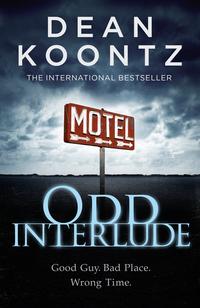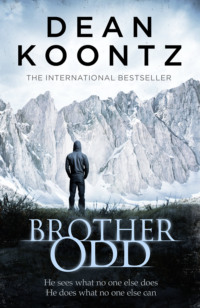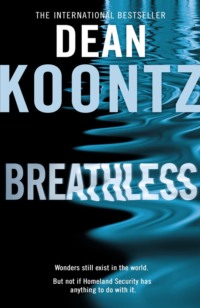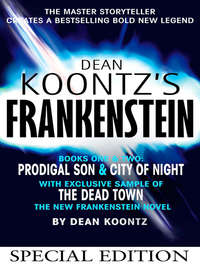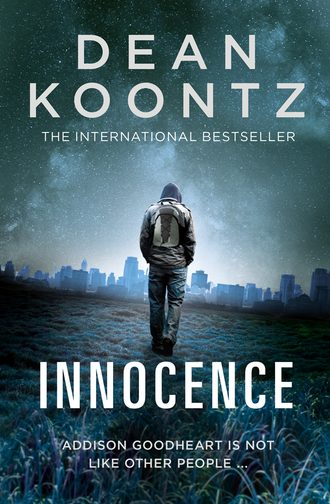
Полная версия
Innocence
On occasion, maintenance teams in electric vehicles the size of pickup trucks passed through primary drains like this. At the moment, however, I was alone. Over the years, I had seldom glimpsed such crews at a distance, and more seldom still had I needed to flee from them to avoid being seen.
I seemed almost to have had cast upon me a spell of solitude. When I traveled below or above ground, people usually turned away from me and I from them in the moment before they might have seen me.
Otherwise, I would have been murdered long ago.
The most recent major rainstorm had been in late October. The tunnel bored into dryness, the floor littered with the small things—plastic bags, empty beer and soda cans, fast-food containers, cups from Starbucks, a knitted glove, a baby’s shoe, a sparkling fragment of costume jewelry—that had settled out of the flow as the last of the runoff withered away.
The amount of debris was not great. I could have walked for miles without stepping on anything. Raised three feet off the floor, however, along both sides of the drain, were maintenance walkways where the surging water rarely deposited trash.
Periodically I passed other louver panels that were nothing more than they appeared to be, and iron-rung ladders that led up to service traps in the ceiling, and the mouths of smaller tributary pipes that, during a storm, fed water to this drain.
In this subterranean maze, earlier drains than this one were built of brick or stone, or concrete blocks. They possessed greater charm than more recent constructions, for they were the work of masons who were also proud craftsmen.
According to metropolitan lore, one crew of masons had been secretly in the employ of a crime boss of that distant era, and they had walled up several of his enemies, some dead but others living. I had never seen one of the small crosses that were supposedly carved into bricks to mark those tombs, nor had I seen any skeletal fingers in the gaps of mortar between stones, like once-questing but long-fossilized pale roots. Perhaps such stories were not true, just urban legends, though I was well aware of how inhumane humanity can be.
When I was halfway to the first intersection of major drains, I spotted a familiar glowing silver-white mist in the distance, one of the Fogs. A coherent and sinuous stream, it swam toward me as if the air through which it moved were water and it were a luminous eel.
I stopped to watch, always curious about this phenomenon and about the other that I called the Clears. In my experience, I had no reason to be afraid, but I admit to feeling uneasy.
Unlike a tendril of genuine fog or an exhalation of steam from a vent, this apparition didn’t feather away at the edges or change shape according to the influence of currents in the air. Instead it serpentined toward me, perhaps seven or eight feet in length and a foot in diameter, and as it passed me, it halted and stood on end for a moment, writhing in the center of the tunnel, as if it were a cobra enchanted by the music of a flute. Thereafter it went horizontal once more and shimmered away, a slither of silvery radiance diminishing to a point, and then gone.
I had seen the Fogs and Clears all of my life. I hoped one day to know for certain what they were and what they meant, although I suspected that I might never be enlightened. Or if I discovered the truth of them, there might be a high price to pay for that knowledge.
Six
“YOU’RE TOO HIGH A PRICE TO PAY,” MY MOTHER declared on the afternoon when she sent me away. “I’ve lived by my own rules, and I expected a cost, but not this. Not you.”
Always as lovely as any woman in any magazine, as any TV star of whom millions were enamored, she had lately looked thin and drawn. Even the evident weariness and the crescents of darkness like fading bruises around her eyes did not detract from her appearance. In fact, they suggested that she was tenderhearted and haunted by some terrible loss, that her pain, like the pain endured by a martyr, was beautiful, which then made her face yet more beautiful than it had been before.
She sat at the kitchen table with the shiny chrome legs and the red Formica top. Near at hand were her medications and her whiskey, which she said was just another medication.
The whiskey seemed to be her best medicine, if you asked me, because at worst it made her sad, but sometimes it made her laugh or just lie down and sleep. The pills, on the other hand, and the powder that she sometimes inhaled, could inspire unpredictable moods in which she cried a lot or raged and threw things, or hurt herself a little on purpose.
Her graceful hands transformed everything they touched into elegant objects: the plain glass of Scotch glimmering like cut crystal as she repeatedly traced one fingertip around its whiskey-wet rim, the slim cigarette like a magic wand from which smoke rose as if to signify wishes granted.
I had not been invited to sit down; and so I stood across the table from her. I made no attempt to approach her. Long ago she had sometimes cuddled with me. Eventually, the most she could tolerate was an occasional touch, smoothing the hair back from my brow, laying one hand over mine for a moment. During the past few months, even a fleeting touch was more than she could endure.
Because I understood the pain that I caused her, the very sight of me an offense, I was anguished, as well. She could have aborted me, but she didn’t. She had given birth to me. And when she saw what she had brought into the world … even then she defended me against the midwife who would have smothered me. I could not but love her and wish that she could love a thing like me.
Beyond the window at her back, the October sky lowered gray and bleak. Autumn had stripped most of the foliage from an old sycamore, but in the fitful wind, the remaining leaves shivered like brown bats about to fling themselves into flight. This wasn’t a day for leaving home, or a world in which to be alone.
She had told me to put on my hooded jacket, and I had done so. She had prepared for me a backpack of food and first-aid items, and I had strapped it on.
Now Mother indicated a wad of cash on the table. “Take that—for what little good it’ll do you. It’s stolen, but you didn’t steal it. I do all the stealing in this family. To you, it’s just a gift, and clean.”
I knew she never lacked for money. I took the gift and stuffed it in a pocket of my jeans.
The tears that had been pent up in her eyes spilled now, but she did not make a single sound of grief. I sensed that she had been rehearsing this scene for a long time, intent on seeing it through without allowing me a chance to improvise a change to the script that she had written.
My vision blurred, and I tried to express my love for her and my regret that I caused her such despair, but the few words that escaped me were distorted, pathetic. I was physically and emotionally strong for a mere boy of eight, and wiser than a child, but still a child if only chronologically.
After crushing her cigarette in an ashtray, she wet the fingers of both hands with the condensation on the glass of iced Scotch. She closed her eyes, pressed her fingertips to her eyelids, and took a few long, deep breaths.
My heart felt swollen, pressing against breastbone and ribs and spine, so it seemed that it would be punctured.
When she looked at me again, she said, “Live by night, if you can stay alive at all. Keep the hood up. Keep your head down. Hide your face. A mask will draw attention, but bandages might work. Above all, never let them see your eyes. Those eyes will betray you in an instant.”
“I’ll be okay,” I assured her.
“You will not be okay,” she said sharply. “And you shouldn’t delude yourself into thinking that you will.”
I nodded.
After draining half the glass of whiskey in a long swallow, she said, “I wouldn’t send you away if it hadn’t been for the hunter.”
The hunter had seen me in the woods that morning. I ran, and he pursued. He shot at me more than once and missed by inches.
“He’ll be back,” Mother said. “He’ll be back again and again and again until he finds you. He’ll never leave those woods for good until you’re dead. And then I’ll be dragged into it. They’ll want to know about me, every little thing about me, and I damn well can’t afford that kind of scrutiny.”
“I’m sorry,” I said. “I’m so sorry.”
She shook her head. Whether she meant that an apology wasn’t necessary or that it was inadequate, I can’t say. She picked up the pack of cigarettes and extracted one.
I already wore knitted gloves, for my hands might also betray me to others. I pulled up the hood of my jacket.
At the door, as I put my hand on the knob, I heard Mother say, “I lied, Addison.”
I turned to look at her.
Her elegant hands were trembling so violently that she could not match the cigarette to the flame of the butane lighter. She dropped the lighter and threw the cigarette aside.
“I lied when I said I wouldn’t send you away if it wasn’t for the hunter. I’d send you away no matter what, hunter or no hunter. I can’t stand this. Not anymore. I’m a selfish bitch.”
“You aren’t,” I said, taking a step toward her. “You’re scared, that’s all. Scared not just of me but of … of so many things.”
Then she was beautiful in a different way, like some pagan goddess of storms, highly charged and full of wrath. “You just shut up and believe what you’re told, boy. I’m selfish and vain and greedy and worse, and I like me that way. I thrive the way I am.”
“No, you’re not those things, you’re—”
“You shut your freakin’ mouth, you just SHUT UP! You don’t know me better than I know myself. I am what I am, and there’s nothing here for you, never was and never will be. You go and live however you can, in farther woods or wherever, and don’t you dare think of coming back here because there’s nothing here for you, nothing but death here for you. Now get out!”
She threw the Scotch glass at me, but I’m sure she didn’t mean to hit me. Her aim was too wide, and the glass shattered against the refrigerator.
Every moment that I lingered was another wound to her. Nothing I could say or do would help her. Life is hard in a world gone wrong.
Weeping as bitterly as I had ever wept—or ever would—I left the house and didn’t look back. I grieved, although not because of either my condition or my lean prospects. I grieved for her because I knew that she didn’t hate me, that she hated only herself. She despised herself not for bringing me into the world in the first place, more than eight years earlier, but for turning me out into it now.
Behind the low overcast, the day waned. The clouds that had been smooth and gray earlier were everywhere coarse and in places kettle-black.
As I crossed the yard, the wind made dead leaves caper at my feet, in the way that small animals, familiars to a witch, might dance around she whom they served.
I entered the forest, confident that the hunter was gone for the time being. His horror had been greater than his rage; he would not linger with night coming but would return with the bright of day.
As soon as I was sure that shadows hid me, I stopped and turned and leaned back against a tree. I waited until I had no more tears, until my vision cleared.
This would be the last I saw of the house in which I was born and thus far raised. I wanted to watch the twilight begin to harden into darkness around those walls, to see lamplight bloom in the windows.
On those days when the sight of me had most troubled Mother, I had roamed the woods until dusk and had either slept in the yard or, on cold nights, in a most comfortable sleeping bag in the ramshackle detached garage. She always left a small hamper of food for me on the front seat of her Ford, and when banished I ate dinner at twilight, watching the house from a distance, because it pleased me so much to see the windows suddenly blush with warm light and to know that, in my absence, she must be at peace.
Now again, as the black of a starless night mantled the small house, as the wind died with the day and a hush settled over the woods, light came to the windows. Those glowing panes reliably evoked in me a most satisfying sense of home and safety and comfort. When I was welcome inside, however, the quality of the same light, seen from within, was not as golden and as stirring as when seen from without.
I should have left then, should have followed the narrow dirt track out to the distant county blacktop, but I delayed. At first, I hoped to see her pass a window, to get one last glimpse of this woman to whom I owed my existence. When an hour passed, then two, I admitted to myself that in truth I didn’t know what to do, where to go, that I was lost here at the edge of the woods as I had never been lost far deeper in the wilderness.
The front door opened, the subtle protest of the hinges carrying clearly to me in the stillness, and my mother stepped onto the porch, backlighted, a mere silhouette. I thought that she might call out to me, hoping I was still nearby, that she might say she loved me more than she feared me and that she’d had second thoughts about sending me away.
But then I saw the shotgun. The pistol-grip pump-action 12-gauge was always loaded in anticipation of unwelcome visitors whom she never named; she called the weapon her insurance policy. She was not holding it casually, but in both hands and at the ready, the muzzle toward the porch ceiling, as she surveyed the night. I assumed she suspected me of lingering and that with this display she intended to convince me that my banishment was final.
I felt ashamed of myself for not honoring her wishes without delay. Yet when she returned to the house and closed the door, I remained in the perimeter of the forest, still unable to make myself set out upon my journey.
Perhaps half an hour passed before the shotgun roared. Even muffled by the walls of the house, the blast was loud in the quiet of the mountain.
At first I thought that someone must have forced his way through the back door or through a window beyond my line of sight, because Mother often spoke of enemies and of her determination to live where they could never find her. I thrashed through the low brush, into the yard, and ran halfway to the house before I realized that no intruder lay wounded or dead in there, no enemy but her worst one, which was herself.
If my death could have brought her back to life, I would have died there in the yard.
I thought that I ought to go inside. She might be only wounded, and in need of help.
But I didn’t return to the house. I knew my mother well. When it was important to her that some task be done, she put all her mind and heart into it, and she accomplished what she set out to do. She neither made mistakes nor took half measures.
How long I stood in the yard, in the dark, in the after-shotgun quiet, I do not know.
Later, I discovered that I was on my knees.
I don’t recall leaving. I realized that I was walking along the dirt lane only a minute before it led me to the blacktop county road.
Shortly after dawn, I took refuge in a dilapidated barn on an abandoned farm, where the house had burned down and had never been rebuilt. Mice were the rightful tenants of the barn, but they were not too frightened of me, and I assured them that I meant to stay only a few hours.
Mother had included the essentials in the backpack, but also a half dozen chocolate-pecan cookies that she had made herself and that were my favorite.
Seven
ON FOOT BENEATH THE CITY, I ARRIVED AT AN intersection where abruptly a rumble rose, the underground thunder of a train, which was the only utility routed deeper than the storm drains. On the rare occasions when a section of the subway flooded, water was pumped up to these tunnels. Before the turn of the millennium, they had pumped it to the sewer lines; but a calamitous backflow once gushed filth through two miles of the subway, requiring weeks of decontamination by hazmat teams, and the existing design was reconsidered.
A city is half beast and half machine, with arteries of fresh water and veins of foul, nerves of telephone and electrical cables, sewer lines for bowels, pipes full of pressurized steam and others carrying gas, valves and fans and filters and meters and motors and transformers and tens of thousands of interlinked computers, and though its people sleep, the city never does.
The city nurtured me and provided me with a secret haven for which I was grateful, but I continued to be a little distrustful of it, and sometimes afraid. Logic insisted that, in spite of its intricacy, the city was only an accumulation of things, buildings and machines and systems, that could not develop an awareness or intent. Yet often it seemed that, though I remained unknown to the people of this place, I was known by the city itself, and watched.
If a city had a life separate from its citizens, then it must have a capacity for both kindness and cruelty. As a creation of men and women, it surely shared their evils as well as their virtues.
The rumble of the train passed away beneath my feet, and beyond the intersection of enormous drains, I turned left into a tributary that sloped upward more than the main tunnel. The passageway lacked elevated service walks, and its dimensions required me to proceed a considerable distance with shoulders hunched and head bowed.
I was so familiar with these subterranean avenues and alleys, I might have found my way without the flashlight. But although I ventured out only at night and lived days in the depths, I was born for light and yearned for more of it than my circumstances allowed.
I came to an open cove in the right-hand drain wall, like half of a cylinder, made of curved concrete blocks. It was five feet in diameter, seven feet high, rather like what you’d find if you took the cover off a manhole, except that a manhole was deeper, wasn’t open on one side, and remained accessible only through the top.
Overhead, a heavy iron lid featured a recessed nut along the perimeter. From my backpack, I removed the one tool it contained: a foot-long iron rod with a T handle at one end and something like a socket wrench at the other. When this gate key engaged the nut and turned it, a rim latch in the lid retracted from the manhole frame, allowing me to push upward, swinging that cover open on its hinges.
My father’s father had appropriated that tool from a street-department truck years before his death. That gate key was the most precious thing I owned. Most of the freedom of movement I enjoyed, such as it was, would be lost if that tool was lost.
After returning the gate key to a zippered compartment of my backpack, I held the flashlight in my teeth, grabbed the frame of the manhole, and drew myself through the open lid and into the basement of the city’s central library. All was silent, as should be the case in such a place, the air dry but not arid, cool but not cold.
In this first hour of a Sunday morning, no one would be in the great building. The cleaning crew had gone. The library remained closed on Sundays. I should have the place to myself until Monday morning. I intended to pass only a few hours within those walls, however, before going elsewhere to resupply the larder in my bunker.
The climate-controlled basement was enormous, a single space with rows of massive columns fanning out toward their tops to create graceful limestone vaults. Between the columns, metal cabinets stood on foot-high concrete plinths. Some of the drawers held ordinary files, but others were wide and shallow to accommodate blueprints as well as small stacks of publications that, brittle with age, couldn’t bear their own weight and would rapidly deteriorate if piled high.
These were the archives of the city’s history, which explained the entrance to the storm drain that was built into the floor. There were other drain caps that, in the unlikely event of a burst water line or other catastrophe, could be opened to ensure that no flood would rise higher than the plinths on which the metal cabinets stood.
I liked that immense space, the colonnades and the curved vaults overhead, which reminded me of photos of the extensive reservoirs constructed by Francois d’Orbay beneath the Water Terrace and gardens of the palace at Versailles. In the moving beam of my flashlight, the shadows of the columns swung aside like great black doors.
A regular elevator and one for freight served the basement, but I never used them. Stairs were silent, safer. Having a choice of enclosed stairwells, I took the one in the southeast corner.
Books, of course, were what drew me to this library. Although Father and his father before him had collected volumes that had been thrown away by those who lived in the open, although I could borrow reading material from thrift stores in which I shopped after hours, many books were not easily found other than in the central library.
The stairs brought me to the walnut-paneled periodical room, where newspapers and magazines could be enjoyed. A short hallway led to the main reading room, a sixteen-thousand-square-foot architectural masterpiece rising from a sea of dark-caramel marble flooring. This immense chamber housed part of the book collection and, beyond that maze of shelves, provided seating for at least five hundred readers at wooden refectory-style tables.
Always before, at this late hour, the reading room had been brightened only by the eerie, ambient light of the city seeping through its high, arched windows. This time, numerous lamps glowed.
I almost retreated, but intuition counseled me to wait, to see, to know.
Decades earlier, night watchmen patrolled the many rooms and corridors of the central library. But in a nation that had nearly spent its way into bankruptcy, sturdy locks and a perimeter alarm were the preferred form of security, because they didn’t require salaries, health care, and pensions.
Through the eight-foot-high rows of shelves, which librarians called stacks, aisles led east-west and north-south. As I approached an entrance to the labyrinth, I heard footsteps that were almost inaudible even in this quietude, footsteps so light and quick that they might have been those of a child ghost desperately fleeing from the recognition of his early death.
In the opening before me, crossing an intersection of aisles, a slender teenage girl appeared from the left, which was the north, gazelle-fast, running with balletic grace and landing on her toes. Her shoes were silver, like the winged feet of Mercury, and otherwise she wore black. Her long hair appeared black, too, lustrous in the lamplight, as a pool of moonlit water lies glossy in the night. One moment there, the next moment gone, she seemed to be running for her life.
I heard no pursuer, though her evident alarm suggested that one must be close on her trail. If she was the prey, I didn’t know—and couldn’t imagine—any predator stealthier than she.
Warily, I entered the stacks. The big chandeliers, hung from the fifty-foot-high ceiling, were not alight. The aisle that the girl had run through lay deserted for its considerable length, illuminated by brushed-steel sconces trimmed with polished brass, like small lamps, fixed high on the six-inch-wide stiles that separated sections of shelving.
These shelves had backs, so that I couldn’t look over the tops of the books into the next aisle. Stepping softly, I continued east, into the next north-south passage that paralleled the first, but the girl wasn’t there.
The stacks were arranged in a large grid, not as mazelike as the board for that old video game Ms. Pac-Man. Yet it seemed far more baffling than a grid as I cautiously made my way through it, spying around corners, turning this way and that as intuition guided me.
I was heading south, approaching a corner, intending to turn left, when I must have heard something, perhaps the faintest squeak of a rubber-soled shoe. I froze between the last two sconces, not in shadow but not brightly lighted.



